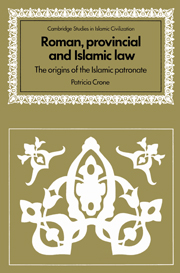Book contents
- Frontmatter
- Contents
- Preface
- 1 The state of the field
- 2 A practical guide to the study of Islamic law
- 3 The Islamic patronate
- 4 The case against Arabia
- 5 The case against the non-Roman Near East: paramonē
- 6 The case for the Roman Near East
- 7 Conclusion
- Appendices
- 1 The slavegirl's twins
- 2 Goldziher on Roman and Islamic law
- 3 The muḥtasib
- 4 Paramonar manumission as tadbīr
- Notes
- Works cited
- Index
2 - Goldziher on Roman and Islamic law
Published online by Cambridge University Press: 16 October 2009
- Frontmatter
- Contents
- Preface
- 1 The state of the field
- 2 A practical guide to the study of Islamic law
- 3 The Islamic patronate
- 4 The case against Arabia
- 5 The case against the non-Roman Near East: paramonē
- 6 The case for the Roman Near East
- 7 Conclusion
- Appendices
- 1 The slavegirl's twins
- 2 Goldziher on Roman and Islamic law
- 3 The muḥtasib
- 4 Paramonar manumission as tadbīr
- Notes
- Works cited
- Index
Summary
Goldziher regarded Roman law as ‘one of the chief sources of Islamite jurisprudence’ (‘Principles’, p. 296). He first stated this in his article published by the Hungarian Academy of Sciences in 1884 (‘Jogtudomány’); he returned to it in his Muhammedanische Studien, published in 1889–90 (cf. vol. I, p. 188n, vol. II, pp. 75f), and he reaffirmed it in his review of Savvas Pacha in Byzantinische Zeitschrift 1893. FitzGerald wrongly lists Savvas as an adherent of the theory of Roman influence on Islamic law. Savvas used to adhere to this theory, as he himself explains (‘L'erreur, en effet, est si facile!’); but his book was based on his new realization that in fact it is exclusively derived from the word of God and the conduct of the Prophet (Savvas Pacha, Études sur la théorie du droit musulman, vol. I, Paris 1892, pp. xviff, xxi). When Goldziher insisted on Roman influence in his review, debiting Savvas' naiveté to his Oriental origins, Savvas wrote a vehement reply, affirming his position on the origins of the Sharī'a and pointing out that whereas he himself [a Greek Christian] was an Aryan, Goldziher [a Hungarian Jew] was a Turanian whose aggressiveness arose from the fact that he still had some drops of Mongol blood in his veins! (Savvas Pacha, Le droit musulman expliqué, Paris 1896, p. 26).
- Type
- Chapter
- Information
- Roman, Provincial and Islamic LawThe Origins of the Islamic Patronate, pp. 102 - 106Publisher: Cambridge University PressPrint publication year: 1987

